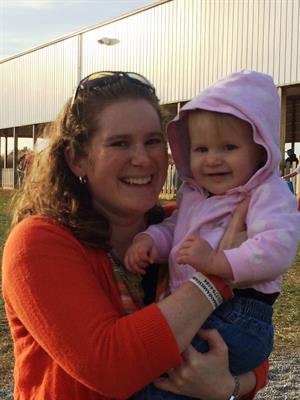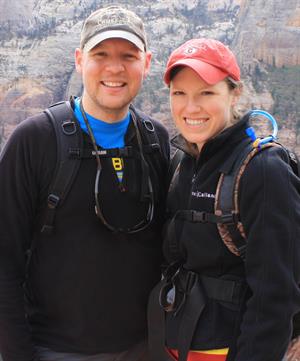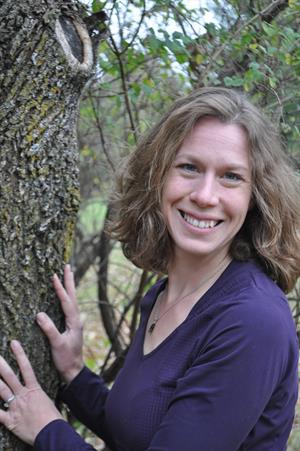In 2005, the Izaak Walton League launched a National Conservation Scholarship to complement chapter and division scholarship programs and support the development of future conservation leaders. The League awards up to two $2,500 scholarships to undergraduates in conservation- or environment-related degree programs. The first scholarships were awarded in 2006. That year, the IWLA Endowment awarded the League a $2,500 grant to help fund the National Conservation Scholarships — and has been doing so ever since.
We thought it might be fun to find out what some of these promising youth have been doing since we last saw them
Lauren Allen Dittman (2006 scholarship)
 Lauren was one of the first two recipients of the League’s national scholarship. She grew up in an Ike family and, as a teenager, helped start a Save Our Streams water quality monitoring program at the Anthony Wayne Chapter in Ohio. After completing her undergraduate degree in geology and environmental science at the Miami University of Ohio, Lauren went on to receive her Master of Arts in earth science education. While in graduate school, Lauren was a graduate assistant teaching Physical Science Laboratory.
Lauren was one of the first two recipients of the League’s national scholarship. She grew up in an Ike family and, as a teenager, helped start a Save Our Streams water quality monitoring program at the Anthony Wayne Chapter in Ohio. After completing her undergraduate degree in geology and environmental science at the Miami University of Ohio, Lauren went on to receive her Master of Arts in earth science education. While in graduate school, Lauren was a graduate assistant teaching Physical Science Laboratory.
She used those credentials when work-ing for the U.S. Geological Survey as a hydrologist, then as a long-term substitute teacher for science classes in Harrison, Ohio. In 2010, Lauren switched gears and took a job at the Cincinnati Children’s Hospital Medical Center as outpatient clinical operations coordinator for the Division of Neurology. Her background must have had prepared her well for this transition because in July 2012, she was promoted to business manager for the Division of Neurology. Lauren also remains an active IWLA member.
Meredith Ann Odato Graham (2007 scholarship)
 Meredith received her Bachelor of Science in natural resources from Cornell University, graduating summa cum laude. She was able to complete her undergraduate studies debt-free by finding scholarships from organizations including the League, the Rocky Mountain Elk Foundation, and Safari Club International. Meredith went on to obtain her Juris Doctor from the University of Pittsburgh School of Law, graduating magna cum laude with a Certificate in Advanced Study of Environmental Law, Science, and Policy.
Meredith received her Bachelor of Science in natural resources from Cornell University, graduating summa cum laude. She was able to complete her undergraduate studies debt-free by finding scholarships from organizations including the League, the Rocky Mountain Elk Foundation, and Safari Club International. Meredith went on to obtain her Juris Doctor from the University of Pittsburgh School of Law, graduating magna cum laude with a Certificate in Advanced Study of Environmental Law, Science, and Policy.
Meredith is currently an associate with the law firm of Babst Calland in Pittsburgh, Pennsylvania, where she assists clients on a variety of environmental matters. Her focus is permitting and regulatory compliance issues arising under the federal Clean Air Act and the state’s air quality programs.
Meredith serves on the University of Pittsburgh’s Law Alumni Association Board of Governors and on the Diocesan Pastoral Council for the Catholic Diocese of Pittsburgh. She is a member of the Marcellus Shale Coalition, the Pennsylvania Independent Oil and Gas Association, and the Allegheny County Air and Waste Management Association. In 2012, the governor of Pennsylvania appointed her to serve a four-year term on the State Board of Veterinary Medicine.
She and her husband also try to get outdoors together as much as possible. Their favorite activities are hunting, hiking, and camping.
Trevor Michaels (2007 scholarship)
For as long as anyone can remember, Trevor has loved the outdoors. So it’s no surprise that, following his graduation from Virginia Polytechnic Institute (Virginia Tech) with a major in wildlife science and a minor in biology and forestry, he went to work for U.S. Department of Agriculture’s Animal and Plant Health Inspection Service (APHIS) in their Wildlife Services Division. For the first couple of years, he had responsibility for the federal Nutria Eradication Project on Maryland’s Eastern Shore, which is located along the Chesapeake Bay. The nutria is a destructive, non-native rodent from South America that was originally introduced to the area for fur farming. Unfortunately, some escaped and started reproducing like mad. The Delmarva Peninsula infestation is now pretty much under control, but there are still many along the Gulf Coast. Trevor says they taste like wild rabbit.
About a year ago, Trevor moved to North Carolina, where he now works for APHIS as a wildlife biologist. He works out of Raleigh-Durham and is in charge of animal control at general aviation airports in the area, where bird and animal strikes are a real hazard. Deer, coyote, fox, and large birds don’t respect fences or warning signs and require some creative tactics to dissuade them from entering airport areas, including habitat management strategies to reduce attraction to airports, restricting access to attractive features such as storm water ponds, and technologies for harassing and deterring problem species.
Trevor is having a great time doing what he’s doing, and it’s going to be interesting to watch how his career with USDA develops over time.
Before leaving Trevor, though, I want to share one brief adventure. After graduation, Trevor re-fitted his old Ford F-250 diesel so that it could run on used cooking oil. He drove across the country and back, hitting national parks along the way. He spent just $120 on diesel fuel — the rest of his fuel was provided by restaurants free of charge, straight from the fryer. Imagine driving down the highway, leaving an aromatic trail of french fries.
Kara Van Nurden Baldwin (2008 scholarship)
 Since graduating from South Dakota State University, Kara has held really interesting positions related to conservation and the environment. She began teaching English as a Second Language courses in a local high school but soon moved to a position as a naturalist at Custer State Park in South Dakota’s Black Hills.
Since graduating from South Dakota State University, Kara has held really interesting positions related to conservation and the environment. She began teaching English as a Second Language courses in a local high school but soon moved to a position as a naturalist at Custer State Park in South Dakota’s Black Hills.
Kara then returned to graduate school to earn a master’s degree in science education with a minor in wildlife management. She worked in the Rapid City School District teaching earth science and biology. When she relocated to Texas, Kara taught science education and biology at a private school and acted as the school’s Adventure Club advisor. She then spent a year with the Brazos Valley Museum of Natural History in Bryan, Texas, planning summer programs and field trips.
Kara has now settled in Milwaukee, Wisconsin, where she is working for the non-profit Urban Ecology Center — an environmental education organization with community centers adjacent to several Milwaukee County parks. The objective of the Urban Ecology Center is to connect urban kids with local parks. Schools also bring small groups for field trips, environmental education, and to develop an appreciation for the outdoors. Kara is responsible for planning and carrying out nature education.
As future conservation leaders, these four young people are all doing well, and Izaak Walton League members can be very proud to have given them support and encouragement. The IWLA National Conservation Scholarship program has been (and remains) an excellent example of the Endowment’s commitment to programs that support the philosophies and objectives of the League.